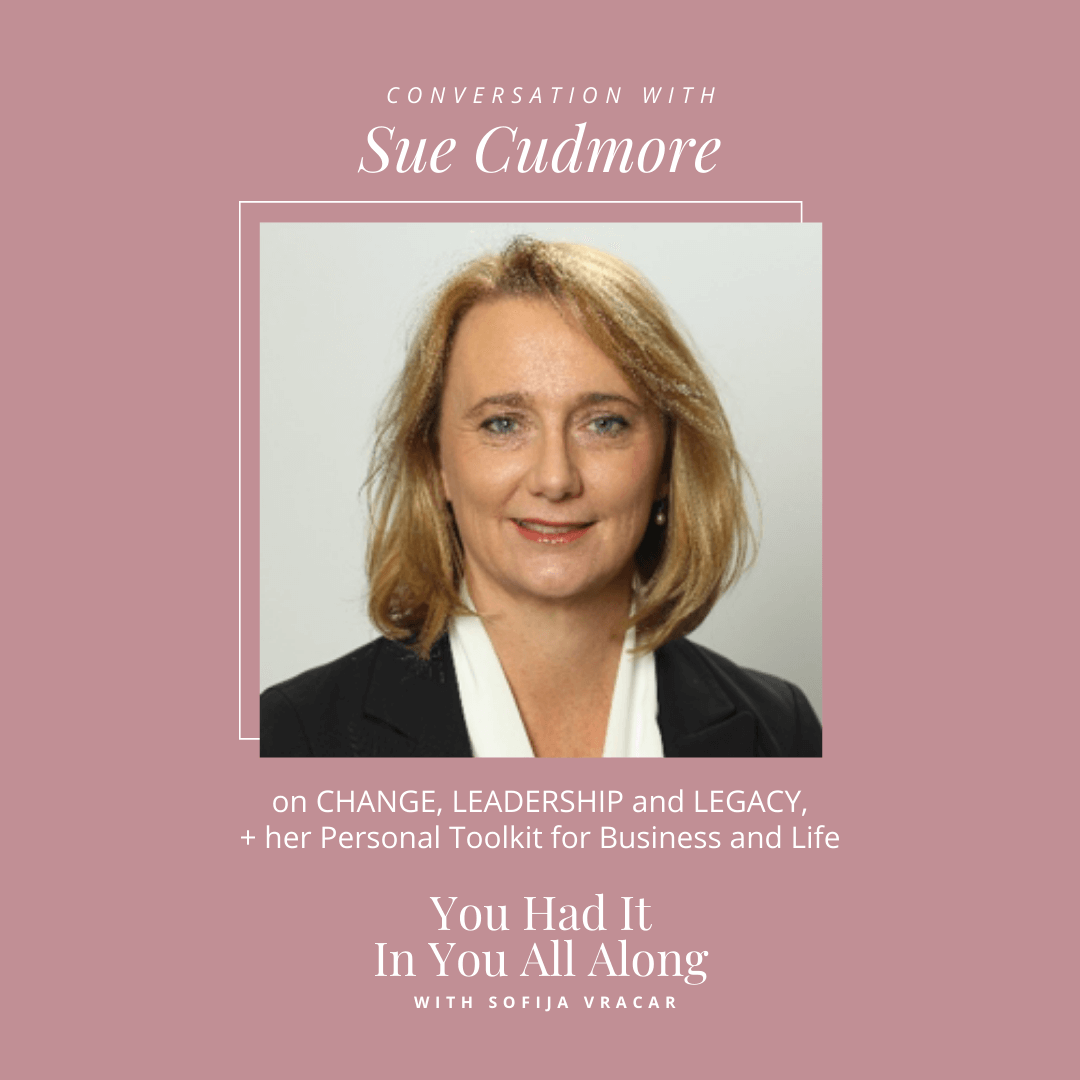Mind (Mentality)
The Essential Personal Toolkit to Adapt and Live Your Best Life
The truth is no matter who you are, where you are in life, or where you want to be, most of us will admit to wanting to be better in some category.
Whether it’s personally or professionally, within our innermost relationships or generally cultivating a clearer sense of purpose in everything we do, each of us has an innate desire to be a better life coach to ourselves. We’re just not sure how to go about it.
There are many pathways and this is where you may become overwhelmed with information overload. The core method I use in my personal life and when coaching my clients is “behavioural modelling”. Naturally, we like to look to others who have got it right, those who have achieved success, and ask how they did it. The good news is, these people are usually quite happy to share, and that is exactly what Sue Cudmore did as a guest on the “You Had It In You All Along” podcast.

LISTEN ON: Apple Podcasts | Spotify | Google Podcasts
Sue is an extraordinary woman executive role model, an experienced Executive and Board Director and successful Entrepreneur. In this episode, she shares her lifelong mantra “change is the only constant” and how this has served both her professional and personal life. Sue talks more on the growth mindset, strategic thinking and the power of flow you can harness when these are combined with your intuition, i.e. your internal guidance system. One of my highlights of this podcast was definitely Sue revealing her ‘Personal Toolkit’ of things that have helped her to adapt to change and be the best leader in her sphere.
The Essential Personal Toolkit to Adapt and Live Your Best Life include:
1. An Inquiring Mind and Self Belief
Someone who is very interested in finding out more about everything.
It comes back to your childhood inquiring mind where “why?” is a question commonly associated with the toddler years. Most parents tire very easily of this endless “why” questions chapter. What we need to do as children mature to adulthood is to encourage them to start asking this question again.
Why? Because it is a sign of an inquiring mind and that is in turn symbolic of an individual capable of independent learning. It also demonstrates a natural curiosity, a passion for learning, a tendency for self-motivation and examination, as well as an ability for critical thinking, all of which are valuable commodities to have in the work environment into which our children will strive to place themselves.
Therefore, by asking “why”, life becomes a colourful journey of exploration and adventure, and not one of passive acceptance.
Self Belief is the positive feeling you have inside that tells you that you are capable of anything. You feel empowered, confident and fuelled with virility in the face of challenges and problems.
When you doubt yourself and lack self belief you are usually in a pattern of letting things slip. Words are powerful so you need to choose them wisely. If you want more in life, you need to stop telling yourself that you can’t, or don’t deserve it, or someone else is better at it, or comparing and wishing you were like anyone else.
So many positive experiences happen when you have self belief as your baseline because it:
- Gives you the freedom to make mistakes.
- Lets you recognise opportunities.
- Helps you find creative solutions.
- Makes others more responsive.
2. Motivation and Desire
Desire is an intense feeling, worthy or unworthy, that impels the attainment or possession of something that is (in reality or imagination) within reach. Motivation is the means which inspires us to achieve the goal which will carve the way to live our life better.
Let’s explore desire and motivation… A desire can lead you to do something you need. Whereas motivation is the final thing which can put you in the place where you want to be when you desire to reach there. Psychology has developed many theories of motivation that aim to explain what drives human behaviour and desire.
Do you occasionally question why you behave the way you do?
You may not know what motivates your actions and behaviours. It is so valuable for you to attempt to understand your intrinsic motivation more clearly. Understanding what drives you can be a beneficial part of becoming more successful and fulfilled in life. This will also create an easier decision-making process for you, particularly when it comes to making big life choices. Once you truly understand the driving forces behind your actions, you can also make sense of how to motivate yourself when feeling down.
3. Critical Thinking to Analyse Experiences to Learn from Them
Critical thinking is the ability to engage in reflective and independent thinking. In essence, critical thinking requires you to use your ability to reason. It’s about embodying presence and being an active learner rather than a passive recipient of information.
Critical thinking means you tend to question ideas and assumptions seeking confirmation rather than accepting them at face value.
When you have authentic critical thinking skills, you will be able to:
- Understand the links between ideas.
- Determine the importance and relevance of arguments and ideas.
- Recognise, build and appraise arguments.
- Identify inconsistencies and errors in reasoning.
- Approach problems in a consistent and systematic way.
- Reflect on the justification of their own assumptions, beliefs and values.

As Sue explained, once you have a clear understanding of yourself and your goals, you can be more confident in not only identifying, but also making big life choices. You will align to your core values and stay consistent with your day-to-day actions. In order to know yourself on a deeper level, you must first understand what motivates you.
Understanding how to ignite the drivers within you is a significant part of becoming more successful, fulfilled, and self aware.
Want more from Sue Cudmore?
If you want to learn more about the Holistic Personal Toolkit from Sue, press play on the episode above or join us on Apple Podcasts, Spotify or wherever you find your podcasts.
